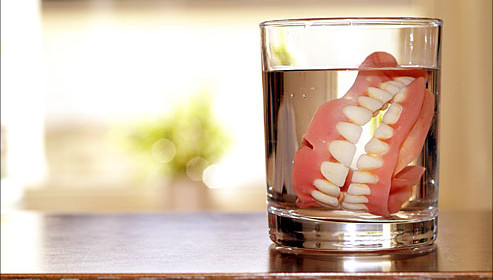
Mouth Infections Linked to Dentures
Mouth Infections Linked to Dentures
Some people who wear dentures get mouth infections, such as:
Cheilitis. This is a painful infection that causes inflammation and cracking at the corners of your mouth. It is caused by an overgrowth of yeast. Yeast can accumulate in moist areas of your mouth if your dentures don’t fit properly.
To prevent cheilitis (also called cheilosis), see your denturist regularly to make sure your dentures fit properly. Also, try not to rub or lick the corners of your mouth.
Stomatitis . This is another infection that is caused by too much yeast. You may not know you have denture-induced stomatitis, because symptoms are not always obvious. When symptoms are noticeable, you may see small red bumps on the roof of your mouth or general mouth redness, especially under your upper dentures.
Both cheilitis and stomatitis can be treated with medicine and proper denture care.
Along with making sure they fit well, it is important to take good care of your dentures. Here are some tips to keep your dentures working and looking their best:
Never sleep with your dentures. Unless your denturist advises you to do so for a specific time, such as after multiple extractions and initial delivery of new dentures, do not sleep with your dentures.
Handle dentures with care. Your dentures are delicate and can break easily. When holding your dentures, stand over a sink filled with water or place a towel on the counter. That way your dentures will be protected in case you accidentally drop them. Also, keep your dentures safely out of reach of children and pets.
Clean your dentures daily. Here are some tips for cleaning your dentures:
Soak your dentures overnight in a denture cleaner.
Thoroughly clean them each morning before putting them in your mouth.
Use a soft-bristled brush or special denture-cleaning brush.
You can use plain soap and warm water or ask your denturist to recommend a denture cleaner.
Never use powdered household cleaners or bleach on your dentures, nor toothpaste, which is too abrasive.
Clean your mouth daily. Clean and massage your gums, tongue, and roof of your mouth each day before putting in your dentures. This will help keep your mouth healthy.
Store your dentures properly. When your dentures are not in your mouth, store them in a denture-cleaning solution or warm water. Do not use hot water. Hot water may cause your dentures to lose their shape.
Don’t use toothpicks. Toothpicks can damage your dentures.
Wearing dentures can be difficult at first. It may take time to get used to them. But you can prevent denture problems by taking good care of your dentures and seeing your denturist every six months for regular checkups. If you notice changes to the way your dentures fit or any other mouth problems, see your denturist right away.
Mouth Infections Linked to Dentures
Some people who wear dentures get mouth infections, such as:
Cheilitis. This is a painful infection that causes inflammation and cracking at the corners of your mouth. It is caused by an overgrowth of yeast. Yeast can accumulate in moist areas of your mouth if your dentures don’t fit properly.
To prevent cheilitis (also called cheilosis), see your denturist regularly to make sure your dentures fit properly. Also, try not to rub or lick the corners of your mouth.
Stomatitis . This is another infection that is caused by too much yeast. You may not know you have denture-induced stomatitis, because symptoms are not always obvious. When symptoms are noticeable, you may see small red bumps on the roof of your mouth or general mouth redness, especially under your upper dentures.
Both cheilitis and stomatitis can be treated with medicine and proper denture care.
Along with making sure they fit well, it is important to take good care of your dentures. Here are some tips to keep your dentures working and looking their best:
Never sleep with your dentures. Unless your denturist advises you to do so for a specific time, such as after multiple extractions and initial delivery of new dentures, do not sleep with your dentures.
Handle dentures with care. Your dentures are delicate and can break easily. When holding your dentures, stand over a sink filled with water or place a towel on the counter. That way your dentures will be protected in case you accidentally drop them. Also, keep your dentures safely out of reach of children and pets.
Clean your dentures daily. Here are some tips for cleaning your dentures:
Soak your dentures overnight in a denture cleaner.
Thoroughly clean them each morning before putting them in your mouth.
Use a soft-bristled brush or special denture-cleaning brush.
You can use plain soap and warm water or ask your denturist to recommend a denture cleaner.
Never use powdered household cleaners or bleach on your dentures, nor toothpaste, which is too abrasive.
Clean your mouth daily. Clean and massage your gums, tongue, and roof of your mouth each day before putting in your dentures. This will help keep your mouth healthy.
Store your dentures properly. When your dentures are not in your mouth, store them in a denture-cleaning solution or warm water. Do not use hot water. Hot water may cause your dentures to lose their shape.
Don’t use toothpicks. Toothpicks can damage your dentures.
Wearing dentures can be difficult at first. It may take time to get used to them. But you can prevent denture problems by taking good care of your dentures and seeing your denturist every six months for regular checkups. If you notice changes to the way your dentures fit or any other mouth problems, see your denturist right away.
Leave a reply →


Your article is to a great degree helpful and has awesome data. I esteem your attempt and all the best. It’s incredibly positive information. I will sit stretched for your next post. Keep It up.
Reply →I esteem your attempt and all the best. It’s incredibly positive information. I will sit stretched for your next post. Keep It up. <a href="http://2quotes.net/life-quotes/seasons-change-quotes-good-weather-quotes.html">quotes about changing seasons</a>
Reply →in reply to amitythomas
SnapTik App is one of the best TikTok Downloader available online to download video tiktok without a watermark.
Reply →You are not required to install any software on your computer or mobile phone, all that you need is a TikTok video link,
and all the processing is done on our side so you can be one click away from downloading videos to your devices. <a href="https://snaptik.ca/">snaptik</a>
in reply to snaptik
Snaptik allows users to download videos from TikTok links without the watermark! Snaptik allows users to download videos from TikTok links without the watermark! For users who want to download TikTok videos from Snaptik in MP4 format to their device, we have developed our free alternative of Snaptik video downloader. Application is not required. At ssstiktok website, we have developed the simplest and most convenient solution for Snaptik TikTok download <a href="https://snaptick.cc/">snaptik online</a>
Reply →I esteem your attempt and all the best. It’s incredibly positive information. I will sit stretched for your next post. Keep It up. <a href="http://2quotes.net/life-quotes/seasons-change-quotes-good-weather-quotes.html">quotes about changing seasons</a>
Reply →THANK YOU FOR SHARING http://2quotes.net/life-quotes/seasons-change-quotes-good-weather-quotes.html
Reply →Your article is to a great degree helpful and has awesome data. I esteem your attempt and all the best. http://123cookinggames.net/cooking-games-for-boys.html
Reply →